Have you ever spent a sunny afternoon watching your backyard chickens clucking around, pecking at the ground, and occasionally snapping at a buzzing fly? If you’re anything like me, you’ve probably wondered, do chickens eat flies? Well, the simple answer is yes, chickens do eat flies.
This might come as a surprise to some. After all, flies aren’t exactly what we’d consider a gourmet meal. But for our feathery friends, flies can provide a much-needed protein boost, especially during the warmer months when these buzzing critters are abundant. But just like any other food, some considerations must be made.
In this article, we’ll delve into the fascinating world of chickens and their dietary habits, focusing on their relationship with flies. We’ll explore flies’ nutritional value, their role in a chicken’s diet, and how this interaction impacts poultry farming. Whether you’re a seasoned chicken owner or just curious about these intriguing birds, there’s plenty to learn and discover.
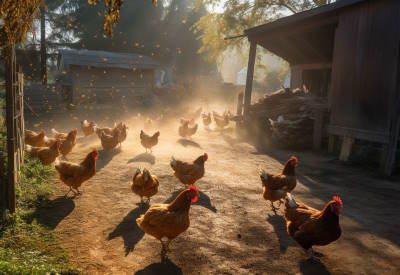
Understanding a Chicken’s Dietary Habits
Have you ever wondered what’s on the menu for your backyard chickens? Chickens are quite the omnivores, happily pecking at grains, fruits, vegetables, and even insects. The variety of their diet is a key factor in maintaining their overall health and happiness. Age, breed, and environment can greatly influence their culinary preferences.
Chickens and Insects: A Key Part of Their Diet
Let’s narrow down to a category that often causes some eyebrows to raise – insects. Yes, your feathery friends are quite the bug connoisseurs! Insects play a crucial role in a chicken’s diet. They’re not just a source of amusement for them to chase around the yard but also provide essential proteins, vitamins, and minerals that chickens need.
From worms to beetles to spiders, chickens are all about that insect life. But this leads us to an interesting question: what about flies? Do chickens eat them too?
[ChickenAffiliate]
Do Chickens Eat Flies: Breaking Down the Facts
If you’ve spent any time watching your chickens, you’ve probably seen them snap at a fly or two. Chickens are opportunistic eaters, meaning if they see something that looks like food, they’re likely to try it. And flies? They definitely fall into the “edible” category.
Now, flies might not be the top choice in a chicken’s diet due to their speed and flight capabilities. However, chickens are surprisingly fast and have excellent coordination, so catching a fly isn’t as impossible as it might seem. Plus, flies are a good source of protein, making them a nutritious snack.
The Role of Flies in a Chicken’s Diet
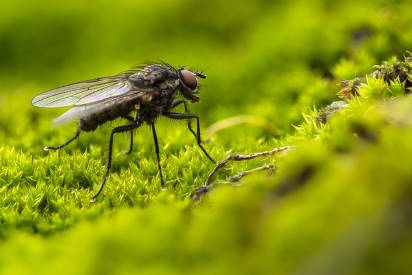
When it comes to the role of flies in a chicken’s diet, it’s a bit of a mixed bag. On the one hand, they provide an excellent source of protein, especially during the warmer months when they’re abundant. They’re sort of like a flying protein snack if you will.
On the other hand, not all flies are created equal. Some flies can carry diseases or have been in contact with harmful substances, which could potentially risk your chickens’ health. So, while they can be a beneficial part of a chicken’s diet, keeping a close eye on the overall cleanliness and health of your flock’s environment is essential.
Encouraging Fly Consumption: Is It Good or Bad?
Now that we know chickens eat flies, should we encourage this behavior? As with most things, moderation is key.
Encouraging fly consumption can be a great way to supplement your chickens’ protein intake, especially if other sources are scarce. However, you shouldn’t rely on flies as a primary source of nutrition. Think of them as a treat, a little extra for your chickens to enjoy.
Remember to consider potential health risks. If your area is prone to flies that carry diseases, or if the flies have access to harmful substances, it might be best to discourage your chickens from chowing down on them.
The Relationship Between Chickens and Flies: Impact on Poultry Farming
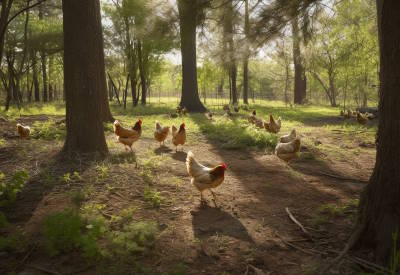
Chickens’ fondness for flies isn’t just a quirky fact – it can significantly impact poultry farming, too. Chickens can serve as a natural pest control, helping keep fly populations in check. This can lead to a healthier, more hygienic environment for the chickens and the farm.
However, it’s crucial to balance this with the potential risks. If there’s a chance that the flies could harm your chickens, it might be best to use other methods to control the fly population.
In sustainable farming, chickens eating flies can be a win-win situation. Chickens get a tasty, protein-packed snack, and the farm benefits from natural pest control. This way, we can reduce the reliance on chemical pesticides, contributing to a healthier, more eco-friendly farming environment.
Sustainable Farming Practices Involving Chickens and Flies
Incorporating chickens into a sustainable farming strategy can be as simple as letting them roam freely around the farm or as complex as setting up a dedicated insect farm. For instance, some farmers are experimenting with breeding Black Soldier Flies to provide their chickens with a constant, controlled supply of nutritious snacks.
These flies are safe for chickens and beneficial for breaking down waste, thus contributing to a circular farming system.
Remember, it’s all about balance. While flies can offer a nutritional boost, they should not replace a well-rounded diet that includes grains, vegetables, and other protein sources. Providing a variety of food sources will ensure your chickens stay healthy and productive.
Fly Control in the Chicken Coop
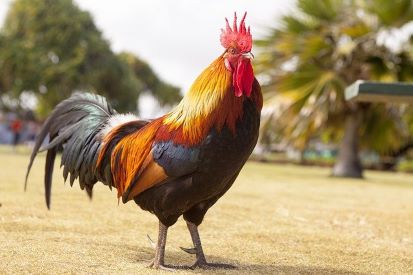
Keeping your chicken coop free from an overpopulation of flies is crucial for maintaining the health and happiness of your chickens. Regular cleaning of the coop, removal of old food, and proper waste management can significantly reduce the appeal of your coop for flies.
Fly traps can also be an effective tool, capturing adult flies and reducing the breeding population. Another strategy involves fly predators, tiny non-stinging wasps that feed on fly larvae, preventing them from maturing into adults.
These natural methods can help ensure a more hygienic environment for your chickens while minimizing the risks associated with chemical insecticides.
The Life Cycle of a Fly and Its Impact on Chickens
Flies have a four-stage life cycle: egg, larva (maggot), pupa, and adult. Each stage presents a different interaction with chickens. For example, chickens might find maggots in compost heaps or waste areas, becoming an unexpected protein-rich snack.
Adult flies, however, could be potential disease carriers, posing a risk if consumed by chickens. By understanding the life cycle of a fly, chicken owners can take steps to manage each stage effectively, thus reducing potential risks and enhancing the benefits for their flock.
Flies and Disease Transmission in Chickens
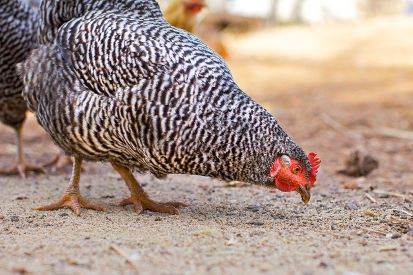
Flies can be vectors for various diseases that can affect chickens. These include parasitic infections like coccidiosis, bacterial infections like salmonella, and viral infections like avian influenza. Signs of these diseases can vary but often include changes in behavior, reduced egg production, weight loss, or signs of illness like diarrhea or respiratory distress.
Prevention strategies include:
- Maintaining a clean coop
- Ensuring good nutrition for your chickens
- Using natural methods to control fly populations.
Attracting Beneficial Flies to the Chicken Coop
Finally, not all flies are pests. Some, like the Black Soldier Fly, can be beneficial. The larvae of Black Soldier Flies are voracious decomposers, breaking down organic waste quickly. At the same time, they’re an excellent source of protein for chickens.
By setting up a Black Soldier Fly bin, you can provide a constant, controlled supply of larvae for your chickens while effectively managing your organic waste. Remember, these flies shouldn’t replace a balanced diet for your chickens but supplement it.
What Other Insects Can Chickens Eat Apart from Flies?
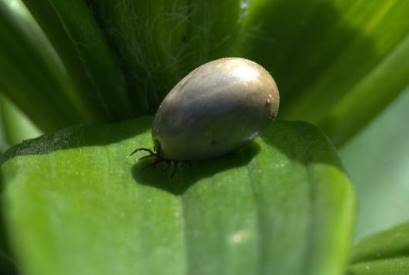
While flies are often on the menu for chickens, they’re not the only six-legged delicacy that our feathered friends enjoy. Chickens have quite a palate for various insects, each offering unique nutritional benefits. So, let’s look at other crowd favorites in the chicken coop.
Ticks
Ticks may be a nuisance to us, but they’re a crunchy delight for chickens. Ticks are rich in protein, which is crucial for a chicken’s health, contributing to its growth, egg production, and feather maintenance. Moreover, chickens can be key in controlling tick populations, benefiting areas prone to tick-borne diseases.
Read More: Do Chickens Eat Ticks? Unveiling Their Role In Pest Control
Mosquitoes
A chicken snapping up mosquitoes is like a live-action backyard pest control system. Mosquitoes, like flies, are rich in protein, and chickens can consume them in large quantities during the warmer months when mosquito populations spike. As a bonus, a mosquito-eating chicken can help lower the risk of mosquito-borne diseases in your yard.
Read More: Do Chickens Eat Mosquitoes? Surprising Benefits Revealed
Maggots
While the idea of eating maggots might make us squirm, for chickens, it’s a protein-packed feast. Maggots are easy to digest and provide an excellent source of protein and fat. They’re often found in decomposing organic matter, so chickens scratching and pecking around compost heaps could be rewarded with this high-energy snack.
Read More: Do Chickens Eat Maggots? Unveiling The Surprising Benefits
Fleas
Fleas are another insect chickens won’t hesitate to snap up. While small, fleas can provide a nutritional snack and help chickens fulfill their natural foraging behaviors. Plus, having chickens around can help keep flea populations in check, contributing to a healthier environment for other pets.
Read More: Do Chickens Eat Fleas? Your Backyard’s Secret Pest Patrol
Bees
You might be surprised to learn that chickens will also eat bees. Though not a primary choice due to their sting, chickens can and will eat them when the opportunity arises. Bees offer a good amount of protein. However, remember that an active beehive should never be considered a chicken food source due to the risk of stings and potential harm to the chickens and the bees.
Read More: Do Chickens Eat Bees? The Surprising Truth Revealed
Do chickens eat flies – final thoughts
We’ve certainly buzzed around quite a bit in this article, haven’t we? We’ve learned that while chickens are busy clucking around, they’re also partial to playing a game of ‘snap-the-fly.’ Indeed, chickens do eat flies. And not just because they enjoy a good chase but because these pesky insects are a protein-packed snack, adding a little zing to their daily pecking routine.
But as we’ve seen, there’s more to this chicken-fly interaction than meets the eye. From supplementing a chicken’s diet to contributing to sustainable farming practices, flies play an unexpected role in the lives of our feathered friends. So next time you see a chicken snap at a fly, remember, it’s not just pest control; it’s a display of nature’s intricate and fascinating web.
Related Articles:
